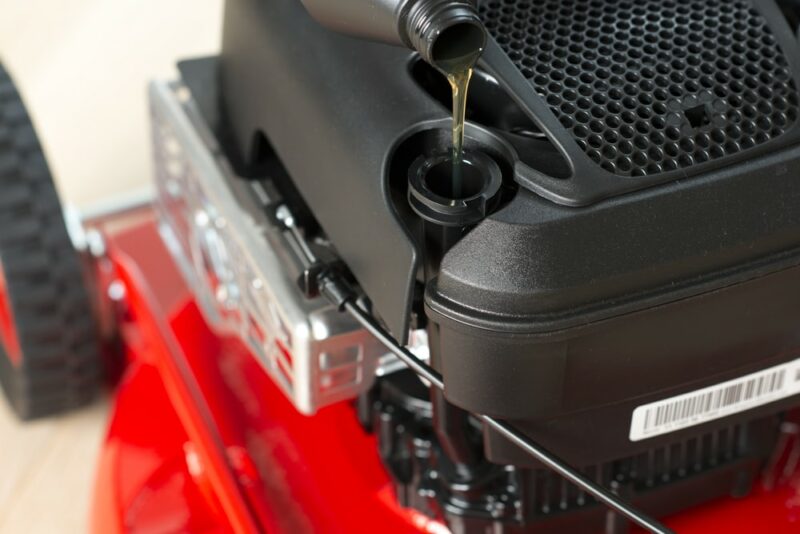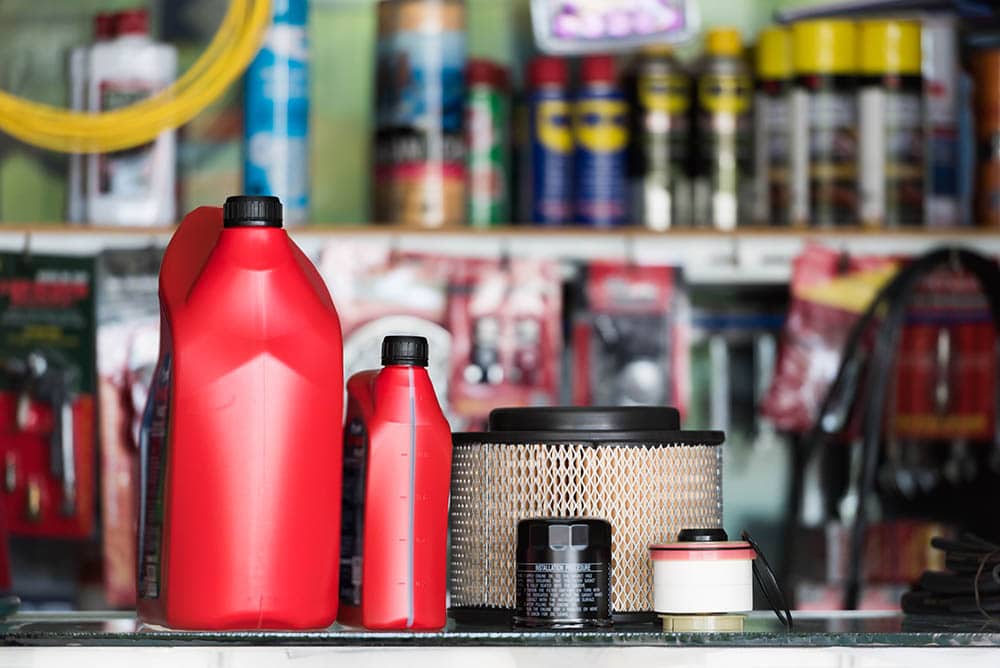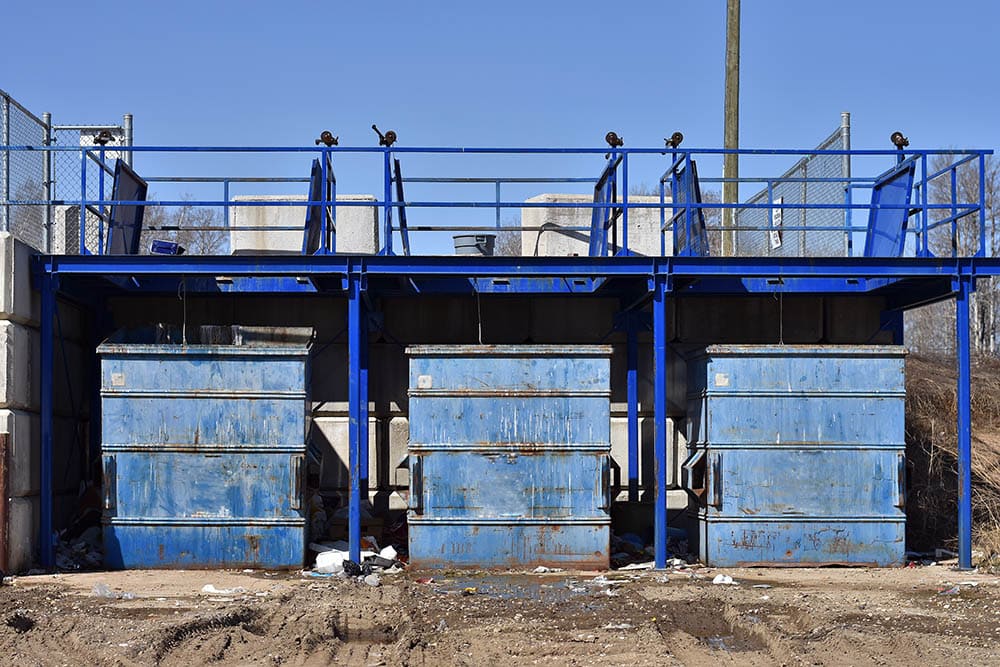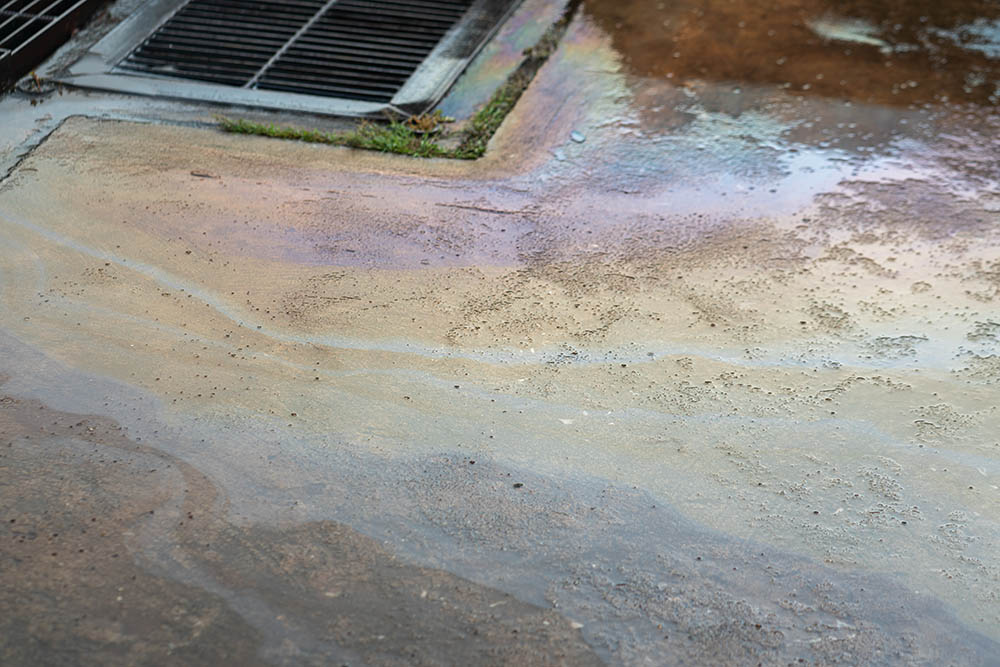How to Dispose of Lawn Mower Oil: 4 Useful Tips & Tricks
-
- Last updated:

Like any functioning machine, lawn mowers have bits and parts that need to be oiled regularly to run smoothly. The engine, for starters, has many moving parts that work at high speed and temperature.
Oiling is, therefore, required to avoid high friction that would otherwise lead to wear and tear. The oil acts as a lubricating and cooling agent, which is vital for your lawn mower’s health. In fact, you can tell a well-oiled lawn mower from one that isn’t. The latter is likely to have worn-out parts, smoke, and sparks from the engine.
For most owners, oiling their lawn mowers is not the most challenging bit. However, most people have an issue with disposing of the oil residue from the lawn mower. The last thing you want to do is wrongly dispose of the oil.

Where Should You Dispose Your Lawn Mower Oil?
Oil is one of the major pollutants in the environment. When it gets into a water source, it creates a film on the surface, preventing oxygen from dissolving and making the water unsafe for human and animal consumption. It also means that no aquatic life can exist in the water.
You have to find a safe way to dispose of your oil that does not harm the environment, animals, and human life. Some places you can dispose of lawn mower fuel include:
The 4 Useful Tips for Disposing of Lawn Mower Oil
1. Auto Parts Stores
Many stores that sell auto parts also accept oil from vehicle and lawn mower owners. They might even recycle it for you for free. It’s the best option since you get into the store with used oil and leave with usable oil. Even if the store does not recycle your oil, you get to discard it in a manner that is good for everyone.
One of the websites you might use to find an auto shop near you that accepts your used oil is www.Earth911.com. Type in your zip code and add motor oil to help you figure out the nearest shop that will recycle your used oil.

2. Garbage Collection
Some garbage collection companies offer oil disposal services, albeit at a fee. Having your oil picked up outside your house is convenient because your worry about the oil disposal ends the moment you put it out on your curb.
If you plan to use this disposal method, ensure you pack the oil in well-labeled containers to avoid confusion. Go to the company’s website and read the safety policies on how the oil should be disposed of.
If you live in a town or city, the chances are that you already have a garbage collection service. They might even offer to dispose of your oil for free. Most cities do this to protect the city from oil pollution.
3. Transfer Stations

Suppose you have a transfer station near you, the better. They allow you to drop off your used oil at any station, and although it might cost you, they have a fixed price range for amounts under 5 gallons. You can look up the price and figure out whether it is a worthy option.
4. Car Mechanics
Car service stations encounter a lot of used oil since most people take their car for an oil change there. Therefore, they know how to dispose of used oil correctly—they have established methods, and it might be easier to drop off your lawn mower oil there.
Some mechanic shops will even take your used oil for free since they can recycle it and use it. However, if you want them to recycle it for you, you might have to pay.
If you are a regular at the mechanic, they may offer to take it off your hands for free. You might be surprised by how willing they are to help. The best part is that, since they know people in the oil recycling business based on their work, they will refer you to them if they cannot do it themselves.

Tips on How to Dispose of Your Used Oil
Whichever disposal method you choose, the tips below will help you properly dispose of your oil.
- Put your used oil in a clearly labeled container.
- Avoid putting the container with oil on your car seat. If the oil gets on the seats, it could ruin your upholstery and everything that comes into contact with it. If you have to do so, ensure the container is leakproof.
- Place the container in a cardboard box so it remains upright when ferrying it and even when disposing of it since it makes it easier for the disposal service.
- Line your truck with a plastic tarp or trash bag before loading your oil in case of a spill.
- Use kitty litter to soak up the oil in case of a spill.
Where Not to Dump Your Oil
There are many cases of people pouring oil where they are not supposed to. Some do it out of ignorance, while some don’t care. Although it’s probably common sense, some of the places you should never dump your used lawn mower fuel include:
1. The Drain
Not only does dumping used oil down the drain block it, but also the refuse might end up blocking the sewer system in the county, which could affect many households and businesses.
2. On the Ground
Oil takes a long time to biodegrade. Dumping it on the ground pollutes the land and kills any plants and organisms in the soil. Run-off may get into rivers and any other water bodies, thus polluting the water sources.

3. Water Sources
Many people are guilty of dumping their used oil in water sources, especially those that live near water bodies. Some cleaning services even drain their used water containing used fuel into water systems, and this has devastating effects on the ecosystem.
Effects of Disposing Used Oil on the Environment
According to extensive research on this topic, oil pollution can damage the ecosystem for more than 30 years. The effects of oil pollution are devastating and well documented. In fact, oil has been shown to cause catastrophic environmental damage.
1. On the Ecosystem
Oil pollution significantly affects all the organisms in the ecosystem, from birds, fish, and any mammals that may come in contact with the oil. Ingesting it can cause damage to the digestive system, especially the intestines.
It also causes a weakened immune system that can compromise an animal’s ability to find food. In addition, birds risk drowning in the case that their feathers absorb the oil, which happens when oil finds its way into water systems.
2. Human Health
The oil contains many heavy such as lead that can lead to illness and death when humans come into close contact with it.
Other contaminants found in oil can also cause various diseases through inhalation, ingestion, or skin contact. For example, people working in mechanic shops are often found experiencing the following illnesses: lipid granuloma, contact dermatitis, folliculitis, and melanosis.
If you dump used oil on the same land you use to grow your plants, the chemicals can be absorbed. You get some of the same illnesses from eating the food with the substances as the same that you get from ingesting the oil.
3. Aesthetic
Nobody wants to live in a place that has an apparent oil spillage. It looks uninviting and is a clear indication of a lack of hygiene. It might look like a small amount of oil before you pour it, but it spreads widely and creates a wide film over the land and any water surface.

FAQs
Can You Throw Your Used Oil in the Garbage?
Depending on your garbage collection services, you may throw it in the garbage or get penalized. Knowing the garbage collection laws in your state/ region/ county is essential. If it’s allowed, ensure you put the oil in a separated tight container, place it apart from the other garbage and label it. Otherwise, it might end up in the garbage dump and contaminate the ground.
Can You Remove Spilled Oil From the Ground?
Yes, it might be challenging, but it can be done. All you need to do is:
- Sprinkle kitty litter or sawdust on the contaminated ground acts as an absorbent.
- Leave the absorbents on the ground for about 24 to 48 hours, depending on the amount of oil spilled.
- Remove the absorbent materials and replace them with fresh ones until you’re sure there is no more oil remaining.

Bottom Line
The tips included in this article should help you dispose of your lawn mower oil correctly. They will help ensure that you don’t dump it in places that could violate health and environmental codes. Consider recycling your oil if you don’t want to dispose of it. You can use it to paint posts or grease hinges of other machinery, doors, and windows.
Featured Image Credit: tony740607, Shutterstock
Contents

